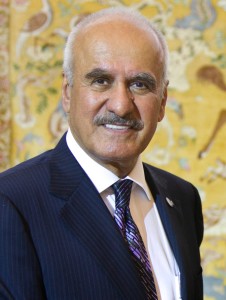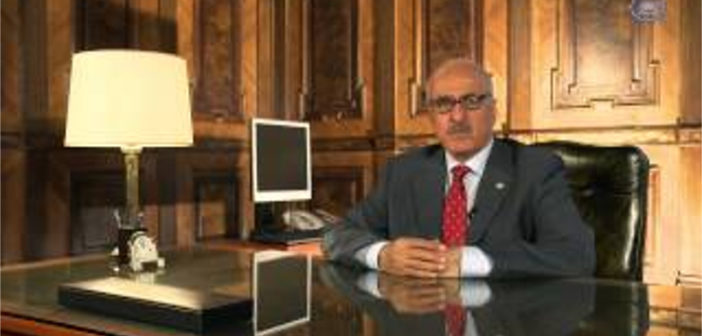 Only a very few knew there was an agency of OPEC- Organization of Petroleum Exporting Countries devoted to providing financial succour to poor countries and aid development. We are all aware of the World Bank, the International Monetary Fund and other sub-organizations of the United Nations. The Opec Fund for International Development (OFID) was established in 1975 and currently under the leadership of Saudi economist, Dr. Suleiman J. Al-Herbish. Dr. Al-Herbish warmly welcomes and grants African Ripple’s Akinola Akingbala an unscheduled interview in his office in Vienna recently. He recants the noble roles the organization is playing in the world especially in Africa, the source and financial position of the organization among other things.
Only a very few knew there was an agency of OPEC- Organization of Petroleum Exporting Countries devoted to providing financial succour to poor countries and aid development. We are all aware of the World Bank, the International Monetary Fund and other sub-organizations of the United Nations. The Opec Fund for International Development (OFID) was established in 1975 and currently under the leadership of Saudi economist, Dr. Suleiman J. Al-Herbish. Dr. Al-Herbish warmly welcomes and grants African Ripple’s Akinola Akingbala an unscheduled interview in his office in Vienna recently. He recants the noble roles the organization is playing in the world especially in Africa, the source and financial position of the organization among other things.
What is the relationship between OFID and other international financial institutions like IMF and the World Bank?
OFID works in close collaboration with these institutions. The idea is to ensure effectiveness of our projects and programs and grant financing, reduce the incidence of duplication and try to complement resources. All our projects are co-financed with the governments of our partner countries and very frequently with other financial institutions too, including the regional development banks and bilateral development finance institutions of Member Countries, which we refer to as sister institutions, among them the Saudi Fund for Development (Saudi Fund); the Kuwait Fund for Arab Economic Development (Kuwait Fund); the Abu Dhabi Fund for Development; and Banco de Desarrollo Economico y Social de Venezuela (BANDES). In recent years we have taken steps to formalize ties with several of our partners in order to give our collaboration a more strategic edge. To this end, we have set upMoUs with the World Bank, the Asian Development Bank, the International Fund for Agricultural Development (IFAD), the Arab Bank for Economic Development in Africa, the Inter-American Development Bank and the Andean Development Corporation. We are currently working on similar agreements with other partners. What is the contribution of each OFID Member Country and how is this arrived at? And what other sources of funds are available to OFID?
Contributions to OFID by Member Countries are on voluntary basis and differ from country to country [see attached table]. Over the years, these resources have been replenished four times, the latest being in 2011, when Member Countries decided on a replenishment of US$1 billion to help respond to growing needs across the developing world. Additional resources are generated through loan repayments and the interest on investments over the years. Our total resources as of January 1, 2012, thus stood at US$5,827.
How would you describe the financial position or status of the organization?
OFID is financially healthy, hence our growing portfolio of projects and programs and the creation of new and additional windows of operation. Apart from our original public sector engagement, we are, today, involved in private sector promotion as well as trade finance. The partner country-count has also been growing over the years. In 2010, we were working in 111 countries. Today, OFID has a presence in 133 countries: 53 of them in Africa, 42 in Asia, 31 in Latin America and the Caribbean, and seven in Europe. By the way, all developing countries are, in principle, eligible for OFID assistance. The least developed countries, however, are accorded higher priority and therefore receive the larger share.
A major engagement of OFID is providing debt relief under the Heavily Indebted Poor Countries (HIPC) Initiative. How has this impacted on debt ridden African countries?
A serious economic obstacle in many developing countries is external debt. HIPC was agreed upon by the international community to ease the debt burden on many of the world’s poor countries. OFID joined the initiative very early, contributing what was called for to battle the burden. Thus far, OFID has devoted and disbursed some US$263 million to the HIPC Initiative, from which several African countries have benefited. The impact on the countries has not been homogenous. Some of them have taken greater advantage of the debt relief than others.
How would you describe the involvement of OFID with the African Development Bank and other regional financial institutions?
OFID has a strong relationship with the financial institutions you mention. There are regional meetings where official representatives exchange views and come up with joint proposals. There are official visits between the institutions and both Management and staff brief and learn from one another. Networking and close cooperation are encouraged as are co-financing and mutual assistance. OFID is thoroughly pleased with the cooperation and collaboration it enjoys with the African Development Bank.
How much has OFID devoted to Africa over the years and on what projects?
Africa, as you can imagine is a major focus of OFID. Most of the world’s least developed countries are located in Africa and OFID’s mandate speaks of aiding non-OPEC developing countries, especially the least developed among them. OFID takes very seriously this aspect of its mandate. More than half of OFID’s financing has, over the years, gone to African countries, especially the poorest among them; and thus far, some US$5 billion of OFID’s public sector financing of US$10 billion has gone to Africa. By the way, African countries have benefited from all social and economic sectors in which OFID has been active. It is also important to note that most of OFID’s grant financing (grants being “donations” for humanitarian causes as well as research and studies) has been devoted to Africa. You equally may have heard about our work in the area of HIV/AIDS. African countries have been major beneficiaries in this continuing health effort. Let me quickly add here that almost everything we do is in response to requests from partner countries. We are approached by the various countries with projects tackling social and economic issues. We join forces with said countries to accomplish their aims and objectives, not to impose our view or notion of what should be done. Let me also make it clear that we do not interfere in the internal affairs of nation states, nor do we place extraneous “conditionalities” on the assistance we provide.
How would you describe the relevance of OFID in light of other multilateral financial institutions in contemporary time?
OFID, over the years, has remained appreciative of the honor and respect accorded the institution by fellow institutions and partner countries alike. OFID is constantly part of development finance groupings usually assembled to examine and take care of some development issue or other. In “contemporary time” OFID has joined all manner of assemblies involved in the development dialogue. Our developmental efforts have been acknowledged by the international community through different awards and recognitions. Currently, Energy Poverty is a major concern of the international community. UN Secretary-General Mr Ban Ki-moon set up in 2011 a high-level group to take care of the globally agreed Sustainable Energy for All Initiative, which he invited me to join. In 2012, I received from the newly-created UNOSSC a Visionary Leadership Award. I was one of six recipients of the award conferred on outstanding leaders by the UN General Assembly’s High-level Committee on South-South Cooperation, in recognition of an individual’s contribution to South-South and triangular cooperation. All of this, we believe, points to OFID’s relevance.
You mention energy poverty and the fact that OFID is playing a leading role in the global Sustainable Energy for All Initiative. Would you care to elaborate on the institution’s involvement in the fight against energy poverty?
With pleasure. Our Energy for the Poor Initiative (EPI) has been our flagship program for the past five years. We attach such importance to it because, quite simply, without energy, developmental progress of any kind is impossible. In fact, we have often described energy poverty eradication as the missing – or 9th– Millennium Development Goal. I would say that OFID’s journey in fighting energy poverty has had three significant milestones. The first came at the Third Summit of OPEC Heads of State in Riyadh in November 2007, when Member States called upon OFID to place energy poverty at the heart of its programs. The second milestone came in June 2008, when King Abdullah of Saudi Arabia launched the EPI, which we then adopted as our plan of action. The third milestone – and high point of our journey – came in June last year when our Member Countries adopted the OFID Ministerial Declaration on Energy Poverty, and committed a minimum US$1 billion to boost the Initiative. So, what does this mean in practical terms? Well, naturally we have substantially increased our commitments to the energy sector. In 2012 alone, for example, we approved over US$380 million – representing almost 30 percent of total commitments for the year – for a total of 27 energy projects. We make a point of utilizing all financial instruments at our disposal so that we can respond appropriately to the different priorities of our Partner Countries. I should also point out that OFID believes that efforts to eradicate energy poverty should be technology neutral – in other words compatible with each country’s natural resources and financial endowment.
Food security is a big problem in a number of countries because of global warming and other factors, what is your organization doing to help boost production in the agricultural sector and feed the world?
Agriculture is a main area of concern for OFID. Along with energy, transportation, education, health, water and sanitation, industry and telecommunication, agriculture has received considerable attention in OFID’s almost four decades of existence. In fact, agriculture ranks third on this list of sectors. In promoting agricultural development, we work closely with the specialized agencies of the UN – these are IFAD, the FAO and the World Food Program. OFID is also a large voluntary contributor to the Common Fund for Commodities. Through the CFC, we help finance a wide range of projects that assist commodity producers in the least developed countries. These activities help to promote food security and also trade. Over the years, we have devoted manifold resources to food production, food distribution, food aid, and agricultural research and studies across the developing world. We have provided grant assistance to countries embattled by drought, famine, desertification and other conditions antagonistic to agricultural development. As OPEC countries, we are ourselves fully aware of these difficult conditions and we rally round countries seeking to improve their agriculture sectors. I should point out, however, that because water and energy are so critical to agricultural production, we have adopted a more comprehensive approach to the issue of food security. This nexus – Energy-Water-Food has a high priority on our agenda.
We’ve spoken about energy poverty and food security. Are there any other important areas of OFID’s work that you would like to highlight?
Yes, indeed. Another area of development that OFID pays particular attention to is that of human capacity building. It may sound obvious to state it, but a well-educated, skilled population is a country’s most valuable resource. For this reason, all our projects have a training component built in as a matter of course. We also channel considerable support to all levels of education, from primary and high school through to vocational college and university. And we foster knowledge exchange by sponsoring the attendance of partner country delegates at conferences, forums and workshops. Then, of course, there is our highly competitive scholarship program, which sponsors outstanding students from developing countries through their Master’s studies. OFID Scholars have graduated from some of the world’s leading universities. We are incredibly proud of these young men and women and the fact that we have helped to provide them with the skills to become development practitioners themselves.
If OFID is created solely or perhaps majorly to foster South-South Partnership with fellow developing countries worldwide with the aim of eradicating poverty, why maintain a permanent office outside its primary target?
You may be aware that OFID comprises countries from Africa, Asia, Latin America and the Middle East. Vienna, Austria, which also hosts several United Nations organs and specialized agencies, along with OPEC and several other multilateral organizations, was the perfect choice to also host our institution. That is why we are here. OFID is grateful for the kind hospitality of this great city with which OFID has had smooth relations since its establishment in 1976.
2013 will mark your 10th year in office, what do you see as your greatest accomplishment so far?
I do not really measure my contributions to development and what you call “accomplishments.” I came to office to move a mandate forward and to promote progress in our partner countries. It is up to others to judge the role I have played and I am still playing. That said,I take great pride and motivation in what we do every day, so we have worked hard as an institution to raise our profile and obtain recognition for our contributions to development cooperation. We have introduced new financing mechanisms and initiatives, such as energy access for the poor, to complement our work in all sectors. Our motto at OFID is “Uniting against Poverty.” Perhaps we should all count our work as done the day we wake up to read that the alleviation (if not eradication) of poverty has become true for all of humankind. Thank you.




